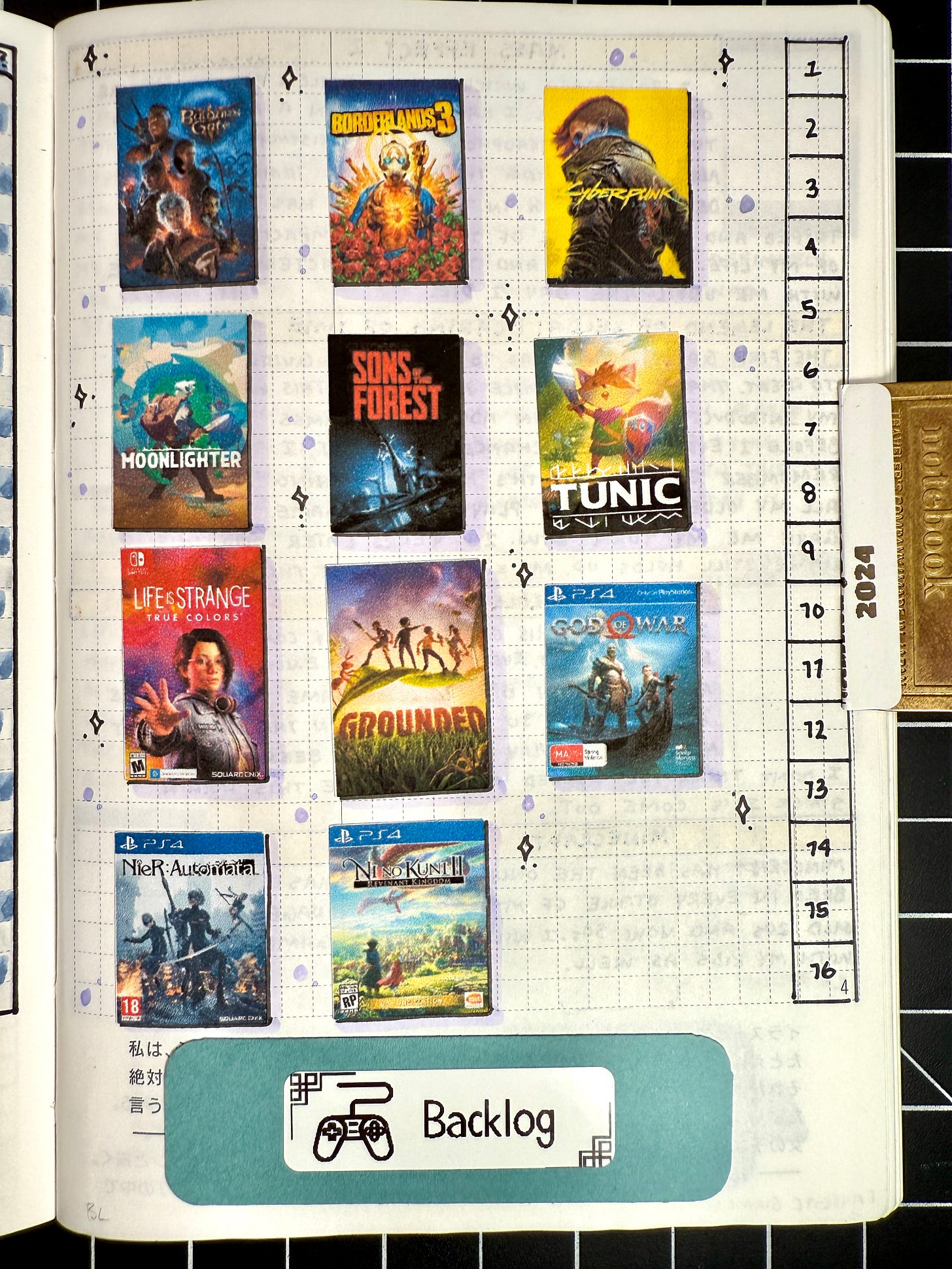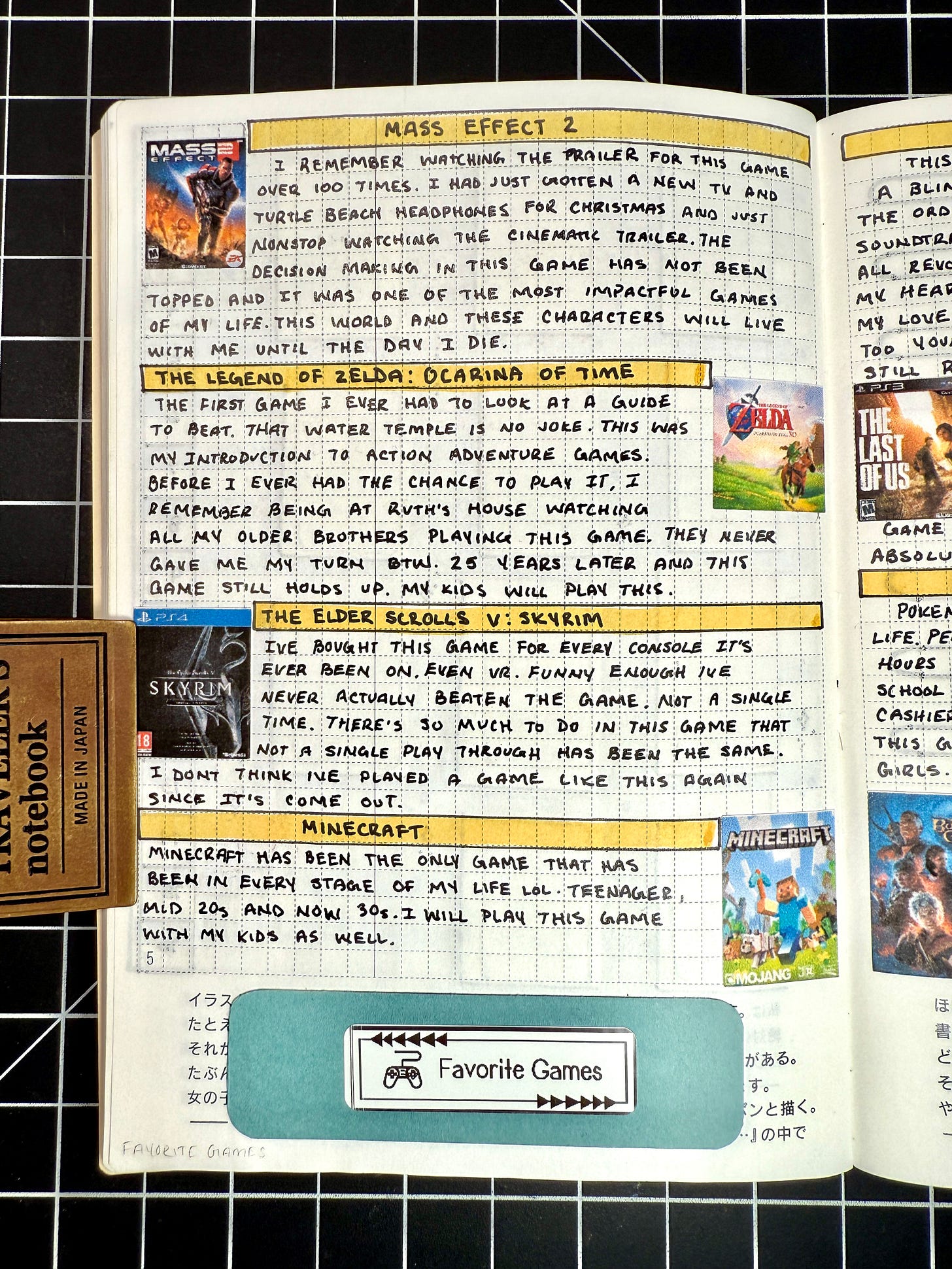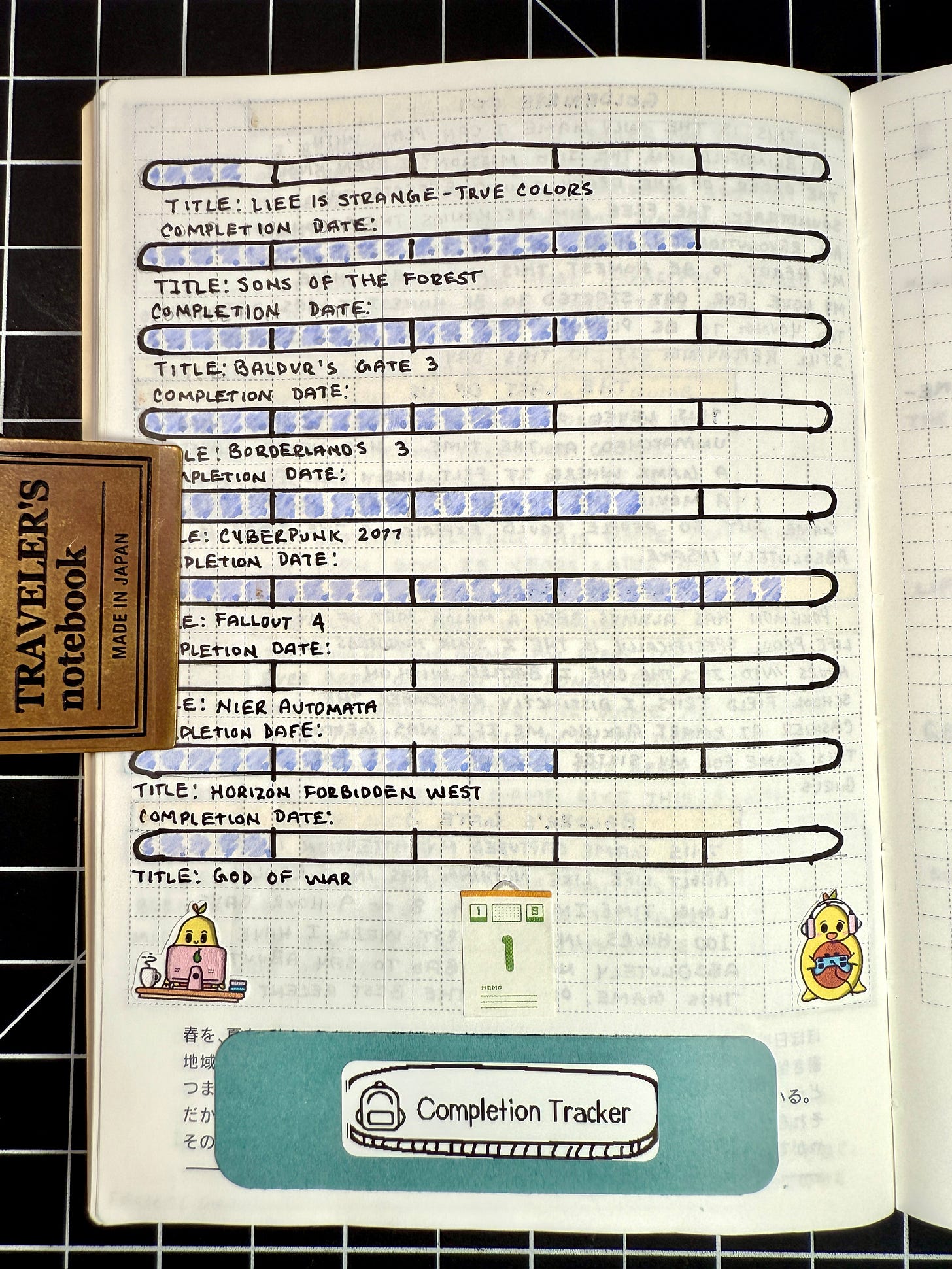I’ve been journaling about my life for years at this point. Emotions, experiences, philosophies, goals. You name it. But I only recently started journaling about video games. Which was weird because I had literally journaled about everything else in my life. Now that I’ve started treating my love of gaming as “serious” journal material, it’s become one of the coolest journals I’ve ever made and most meaningful. Think of this journal as a save file. A save file remembers everything even when you dont. That’s what journaling about your games is going to feel like. It’s going to be a record of who you were when you played a game, what you were feeling, and why it mattered to you. This journal is where my gaming memories live and I wish I would’ve started it a lot earlier.
This isn’t a guide for developers or critics. It’s for gamers like me and maybe you who love games so much that they want to remember them. This is a walk-through of the pages in my gaming journal to give you a bit of insight into a gaming journal and maybe a little inspiration.
Yearly Index - Tracking Gaming Time
This is how I use the yearly index in the Hobonichi that I use as a gaming journal. It’s a snapshot of the amount of time you’ve spent playing video games on any given day. At this point, Im sure it’s not secret that I LOVE tracking my time and gaming is no exception.
Keeping this kind of tracker in your journal will really start to help you identify patterns in your gaming habits. Maybe you played a game more than you thought you would, maybe you’re spending way too much time gaming in general, maybe you have days you’re more inspired to game than others. Awareness allows you to make conscious choices in your habits.
I just highlight the day with a Mildliner, write down the amount of hours I played for the day and move on. This can be as simple or as complex as you’d like. Overall, I think is a great way to better understand you relationship with gaming. Are you playing to decompress, to distract, to engage? I dont know. Check your hours.
Gamer Profile
This is one of the most fun spreads I have in my journal and probably my favorite. Think of this as your gaming resume. Now, hear me out, this might seem like fluff but it’s actually incredibly grounding.
We change as players. Our tastes shift. The type of stories we connect with at 20 are probably different than the ones that move us when we’re 30. Think of this page like a personality test. It reveals who you are as a gamer. I highly suggest revisiting this profile each year.
Here’s what I included on my page:
Favorite Game of All Time
Current Favorite Game
Gamer Tags
Favorite Game Developers
Average Gaming Time (Daily/Weekly)
Most Played Game Ever
First Game I Ever Played
Longest Gaming Session (Be honest)
Favorite Genres
Platforms I Use
Game Collection for the Year
When I started tracking the games I bought, I learned two things very quickly:
I buy way more games than I will probably ever have time to finish.
I get caught in the hype cycle more than I’d like to admit (Im looking at you Oblivion remake)
Let’s be honest, we all know the shame of impulse buys. Specially if we’re into stationery. The gaming hobby is no exception. I log into Steam and all of a sudden I have 5 discounted games in my cart that I KNOW I don’t even have the time to play right now. *buys anyway*. SOOOOO this spread is my accountability system essentially. Every game I buy, digital or physical, goes here with the title, the purchase date, and a mini review out of 5 stars if I finished it. This isn’t just about budgeting, although it does sort of serve like a financial audit, this page is about ownership. By writing them down, I commit to not forgetting them. They don’t get lost in my steam library never to be found again. They’re a reminder of games I can always come back to.
So the tracking here is simple. The columns I use are:
Game Title
Purchase Date
Platform
Price (Optional but recommended)
Mini Review (Out of 5 Stars)
Tip: Color-code by platform or genre for even more visual clarity.
Wishlist
This spread was born out of my tendency to forget games I was excited about. With how demanding life can be and the sheer amount of game releases that come out each year, it can be hard to keep track. Not with this simple but effective baby right here.
The Wishlist is simple:
Game Title
Release Date
Platform
Maybe a little note about why I want it.
But here’s the fun part about this. The anticipation. I let the excitement build using this simple little spread. And honestly? It’s one of my favorite parts of gaming. There’s nothing like playing a game you’ve been waiting YEARS to play and it be exactly what you wanted it to be. I remember sitting next to the Christmas tree in the winter of 05’ with my wrapped up PSP, watching the Grand Theft Auto Liberty City Stories Trailer on repeat, counting down the days until Christmas. It’s still one of the best Christmases I’ve ever had.
Backlog Tracker
Ah, the backlog. It’s every gamer’s shadow. A massive backlog can feel like a dark tunnel with no end in sight. Intimidating. Unending. This backlog tracker lights up that tunnel. Think of each game in this spread as a light leading you out of that tunnel. This is a visual reminder of the games that still deserve to be finished. There’s no deadlines on them. No pressure. Just a page to remind you that it’s okay to take your time with games but maybe…don’t buy 10 more if you still have these unplayed ones in your library.
In this spread, I just printed out the cover art of each game and made a progress bar on the right hand side to see some kind of visual progress as I make my way through this tunnel.
Favorite Games Ever Spread
We all have “that list” of life changing games but they can blur together unintentionally over time. That’s why this section is sacred. In this spread, you’ll dedicate a little section to one of your all time greats and craft a mini essay on why they matter to you. Talk about the impact the game had and how it shaped your worldview. Think of this a series of love letters.
These games shaped me. They’re full of memories. Moments in time when I was a different person and these games healed, challenged, or inspired me. I think it’s just a nice little section that shows gratitude for what games mean to you.
Completion Tracker
Progress bars aren’t just for spreadsheets, they tap into our love of completion. There’s something deeply motivating about a progress bar. Each filled segment is a small and that accumulation keeps you engaged. It’s visual. It’s satisfying. but most importantly, it makes me want to see things through. Not because I have to but because it feels good to finish the things that I start.
In this spread, pick a few games you want to prioritize finishing and add progress bars under them. A lot of games have completion percentages you can find in a menu but if they don’t, this is a section where you can add your own milestones. You can break up your progress bars based on in-game chapters, boss fights, or level progression. Tons of ways to measure progress so really it’s up to you to decide what each block represents.
Favorite Video Game Soundtracks
Music in video games is half of the magic. Same with movie scores. I’ve cried over game/movie music, how about we start there haha. For me, soundtracks aren’t background noise. They’re the emotional glue that hold things together. They hold entire memories together in my brain. I can vividly visualize what I was doing, what I was thinking, and how I felt by re-listening to a song. I can hear a few seconds of a song and I’m there again. Sitting on my childhood bed, playing Aggressive Inline while it snows outside and the plow trucks are driving by. The smell of pancakes in the air. The anticipation of breakfast making your stomach growl and the relief that you got your first snow day of the year. The song that brought back that memory?
Don't Sweat The Technique - Eric B. & Rakim
hahahahahahahaha. yeahhhh not what you were thinking huh. But that song was in Aggressive Inline and I will forever think of that moment when I hear that song.
So maybe think of this section as an emotional archive of your gaming journey. This spread lists:
Song Title
Game Name
Composer (if known)
Where it plays in-game
Why it hits
Memorable Quotes
Some quotes from games hit harder than any book or movie. They’re often short. Simple. But packed with meaning. Some are funny. Some are heartbreaking. Some are profound. By recording quotes alongside context you capture the feelings behind them. This practice sharpens your own writing. When you curate language that resonates, you internalize rhythm, tone, and emotional impact, enriching how you tell your stories too.
It’s a simple layout:
Quote
Character
Game
Scene/Context
Gaming Goals for the Year
We set goals for fitness, finance, careers. Why not gaming?
This section is part accountability, part aspiration. It’s where I map out what I want from my year as a player. Some of it’s measurable (Beat 12 games, Try 3 new genres). Some of it’s aspirational (Finally play a horror game and not quit after 10 minutes). Some of it’s creative (Start building my own game). Writing goals reminds me that gaming isn’t just consumption, it can be growth, challenge, even art. I revisit this page every few months and check in. Sometimes I’ve strayed. Sometimes I’m ahead. But either way, I’m aware, and that’s enough.
Game Reviews
This is the heart of the journal. The soul of it. Every time I finish a game, I sit down and do a full write-up. I write about the experience. What worked, what didn’t, what I felt. Some reviews are glowing. Some are…not. But they’re always honest. It’s the most valuable part of this journal. Years later, I’ll flip back through these and it’s like reading old journal entries from the past. It’s not just about what I played but who I was when I was playing them. It’s a deeper connection and it’s just fucking cool to look back on.
Final Thoughts
When I first started journaling about video games, I wasn’t trying to build a system. I wasn’t thinking about spreads or trackers or layouts. I was just trying to hold onto something I loved. So many of us move from game to game, from title to title, barely stopping to catch our breath. We finish the credits or don’t, scroll past the final stats, and queue up the next adventure. In the moment, it feels like momentum. But later? It often feels like loss.
We forget the names of characters that once made us cry.
We lose track of the exact moment a game helped us get through a hard time.
We can’t quite remember which year we played that game.
This journal isn’t just a gaming journal. It’s a memory keeper like any of your other journals. This has allowed me to be more intentional with my gaming and just feel them more deeply.
Games are art. They’re stories. They’re moments that deserve to be honored and remembered in the same manner we document about our experiences with books and movies.
One day, I’ll be old. I’ll have kids. Maybe they’ll be into games, maybe they won’t. But I know this:
When I flip back through these journals, when I see the names, the quotes, the scribbled reviews, the games that made me who I am, I’ll be grateful I took the time to write it all down.
Because games deserve to be remembered.
And so do we.















Also, I just passed the 100 hr mark in BG3 last night! I’m gonna include more stats like this in my digi diary.
Thank you again for all the inspo!
This is amaaaaaaaaaaazing. I love every bit of it. Such a great walk through too.